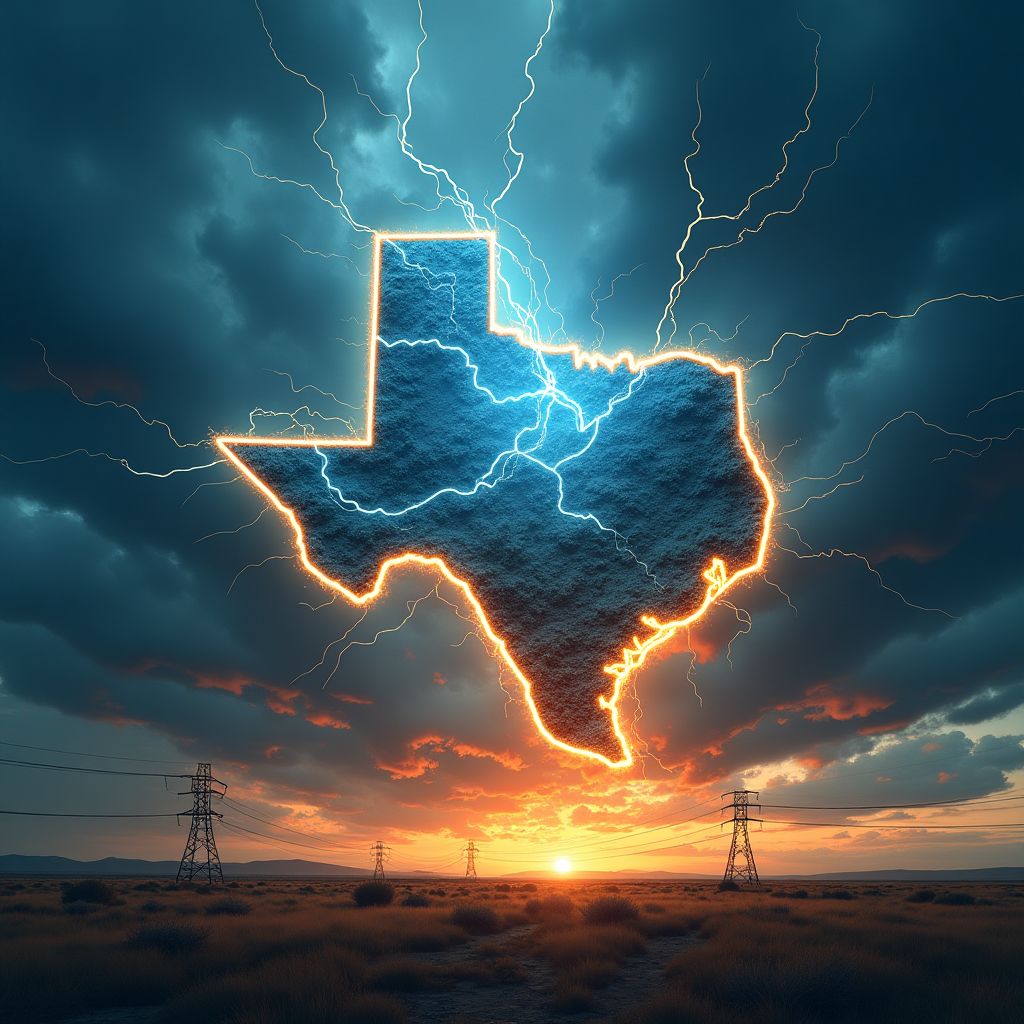Everything is always bigger in Texas—so goes the saying—but apparently, their electricity problems are about to get colossal. You might want to grab your popcorn and adjust your seat, as we’re diving into the fiery waters of the Texas electricity debacle. This situation has personalities, politics, and, yes, a desperate plea to their northern neighbor, Oklahoma. So, saddle up as we untangle this story filled with high voltage drama, wild regulatory antics, and good old-fashioned Texan pride. This article discusses insights from Zeihan on Geopolitics.
First, let's know our enemy: the infamous Texas electricity grid. It's not just your run-of-the-mill grid; it's a whole philosophy. Meet ERCOT, the Electric Reliability Council of Texas, which stands alone like the lone star on their flag. Now, before you go imagining some power-hungry overlord, know this: Texans have taken the art of minimalist regulation to a zenith unmatched by any other state in the nation. This freewheeling approach is charming, but possibly hazardous when nature throws a tantrum.
Breaking Down the Grid: Why Texas is Unique
Our protagonist, 'ERCOT,' plays the solo card in the symphony of America's electricity. There's a mega grid out East and another one out West, and standing apart like an electrified island is Texas with its unique grid. Independence runs through their veins, but in this modern technological era, their distinct positioning might be more of a liability than a badge of pride.
Texas' knack for deregulation has its perks, but its Achilles' heel is apparent. Let's face it, deregulation in Texas means waiting for the market to dictate the rules. While that sounds good in theory, regulations are still necessary to plan for surprises—like Mother Nature swooping hurricane-style with a side dish of chaos and knocking out the power for weeks.
The Texas Electricity Plot Thickens
Enter the capacity market—a quirky set of rules in Texas that begs the question: “To build, or not to build, that is the dilemma.” You see, in Texas, building power facilities costs a pretty penny, as it should, but a particular kind of regulation complicates matters. If power stations aren't used all the time, they don't get enough financial backup, deterring energy entrepreneurs from putting up these power plants.
For instance, peak hours—such a glorious time when Texans come home, crank up the A/C, and start leaving refrigerators open—warrant extra power. Problem: Texas doesn't build 'peaker plants' to cater specifically to these hours because of their quirky market. Go figure!
Stay tuned as we build this electricity tale, which definitely packs more punch than your usual plug-in-the-socket story.
To keep pace, Texas has experienced remarkable industrial and population growth over the last three and a half decades. A powerhouse of potential, so to speak. But without an ample supply of electricity, dreams of economic expansion risk flickering out.
The Texas Paradox: Independent or Dependent?
So here we are: a conundrum, a showdown where independence bears the looming shadow of darkened homes and failed ambitions. What’s a Lone Star State to do? Well, like any good plot twist, it comes down to turning to someone unexpected for help.
Texas might find itself dialing up none other than the state of Oklahoma. Yes, you heard it right! The see-saw of dependence might shift as Texans invite regulations from the big, bad federal government just to get some extra juice from neighboring states. Let that sink in—a possible reconciliation with what they fiercely kept at bay.
Hungry for more of this saga? You can watch the unraveling details in the original video by Zeihan on Geopolitics.
Potential Texas Outcomes: Looking Through the Smoke
What are we in for with the Texan electricity imbroglio? Well, there are two paths on the horizon:
- One option is the inevitable flicker of rolling brown and blackouts as power infrastructure buckles.
- Or, an admission of need—to connect Texas to the nationwide grid and submit under the regulatory umbrella of Uncle Sam.
Such a strategic (or grudging) partnership might signify the end to Texas' isolated sovereignty over its energy affairs. A bittersweet note for those harboring a love for independence.
Empowering Thought Experiments - Dare to Rethink
Are we in an era rethinking traditional methods for the modern age? Could this possibly herald a transitional moment for states flaunting autonomy over integration? Consider how technology has rewritten the playbooks of countless industries, moving them from closed tightly lined silos to open-source, collaborative ecosystems.
Here's a thought experiment: Imagine if Texas becomes the ultimate case study illustrating the balancing act between freedom and responsibility—the guardian of innovation and the keeper of tradition all rolled into one.
So where does this leave us? We have questions—juice-loaded inquiries like:
- How do we redefine energy independence in an interconnected world?
- Is regulatory freedom worth the potential cost of instability?
- Could Texas lead a new charge towards harmonizing autonomy with cooperative resilience?
Your insights matter, and your thoughts light the way! So jump into the comments below. Let’s discuss whether Texas electricity will go bright or blackout.
Also, become part of the "Shining City on the Web" community at iNthacity.com. Sign up to comment, share, debate, and ponder a world that’s always turned on. Don’t leave us hanging in the dark.
Wait! There's more...check out our fascinating short story that continues the journey: Burning Sand and Desert Stars
Disclaimer: This article may contain affiliate links. If you click on these links and make a purchase, we may receive a commission at no additional cost to you. Our recommendations and reviews are always independent and objective, aiming to provide you with the best information and resources.
Get Exclusive Stories, Photos, Art & Offers - Subscribe Today!


























1 comment